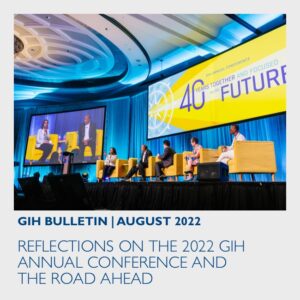Cara V. James, PhD, President and CEO, Grantmakers In Health
It was so wonderful to see everyone in Miami at the 2022 Grantmakers In Health Annual Conference, especially those who joined us for the first time, and to learn more about the work you are doing to achieve better health for all through better philanthropy. The conference occurred at an important moment for our country. As Admiral Rachel Levine, U.S. Assistant Secretary for Health, said during our strategy session on advancing LGBTQ health equity “even after decades of social progress, the most vulnerable among us continue to suffer.” The conference provided an opportunity for us to reconnect, to reflect on the considerable health challenges facing the United States, and to learn and grow together as we explore and share solutions.
As I think back on the many discussions that occurred across the many conference sessions as well as the informal conversations, some key themes emerged where health funders could focus more of their attention and resources in the months and years ahead. Chief among them was a sense that health funders should do more to support civic engagement and bolster democracy. Qiana Thomason of the Health Forward Foundation touched on this during our opening plenary, stressing that “when we look at the data, which includes the lived experience of our community, it is clear that civic engagement—participation in democracy—is the newest social determinant of health.”
A related theme that emerged is philanthropy’s role in supporting the dissemination of accurate information and the need to support local media to minimize the risk of information deserts, which is related to lower civic engagement.
Another theme that emerged was the need for philanthropy to make long-term investments because the challenges we faced cannot be solved in a one, two, or three-year grant. This was coupled with the challenge and tension associated with evaluating long-term investments and accountability to boards of trustees looking to ensure that the foundation’s resources are being used responsibly.
Finally, several people mentioned the need for health funders to do more in collaboration with each other. As one foundation president noted we partner all the time to do our work, just not with each other. Working together can help minimize duplication and magnify our collective impact. The challenges we face are not ones that can be solved without health funders working together and in partnership with other sectors, including the government and the communities we are trying to help. Now more than ever, we need to engage with diverse voices in our communities, making sure that we are working in concert with people on the ground, listening to them, and collaborating in the cocreation of solutions, as well as the identification of problems and their causes.
The theme of this year’s conference, 40 Years Together and Focused on the Future, was inspired by our anniversary and our strategic plan, which orients us towards a future centered around achieving health equity and using our voice to help advance the field and improve health for all communities. Our work will continue to be informed by you and your needs, and I want to thank each of you who participated in a focus group, shared your policy and advocacy priorities, and completed an evaluation, and I invite you to continue the conversations and the work in November at GIH’s Fall Forum in Washington, DC.

